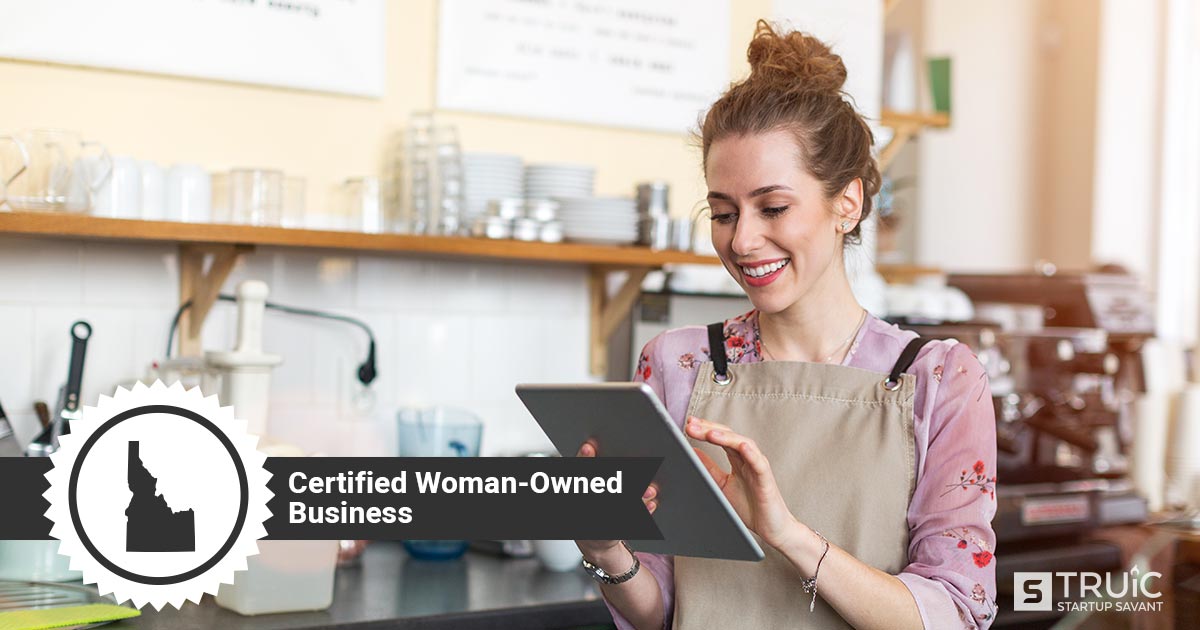A Woman-owned Business Certification in Idaho can have a serious impact on your business for the better. It can mean the difference between being approved for the new federal government contracts you want or keeping a business struggling to stay afloat.
Choosing and applying for a woman-owned business certification can be a little daunting though, especially if you’re new to the process. We’ll give you more information about what it means to apply for a certification, how to qualify, what the benefits are in Idaho including additional businesswomen resources available.
How To Use Our Guide:
We've narrowed down the Women-Owned Business certification process. There are many resources (e.g. WBE or SBA) that will help with your application.
Follow our guide to learn more about how to become a certified Woman-Owned Business in Idaho.
What Is a Certified Woman-Owned Business?
A certified woman-owned business is one that has fulfilled all the requirements of the organization granting the certification. These official designations were originally conceived as a means of correcting a power imbalance for women-owned businesses, as male-owned businesses are much more likely to be approved for contracts and partnerships across the board.
The businesses that apply for certifications are those who want to work with either government agencies, state organizations, or corporate America. Today, the government aims for women-owned businesses to receive at least 5% of all federal contracting dollars. In order to first be considered for the work, your business has to prove that women are in charge.
The most influential group to grant certifications to women entrepreneurs has been the Small Business Administration (SBA). This federal agency offers two major options: Women-Owned Small Business (WOSB) and Economically Disadvantaged Women-Owned Small Business (EDWOSB).
You can also consider applying for a National Women’s Business Enterprise (NWBE) certificate. The difference between the certifications comes down to how funds are distributed and which groups are issuing the offer. For example, most federal groups will only accept a WOSB or EDWOSB. However, a municipal organization may accept an NWBE for a variety of contracts.
A certification is especially recommended if your Idaho business operates in a traditionally male-dominated space. Major corporations or the government may have set-aside funds specifically for EDWOSBs to give financially challenged businesswomen a leg up in the economy through additional resources. Regardless of the certification you choose, your business name will be listed in a directory that organizations can use to verify that you are who you say you are.
Women-Owned Business Third-Party Certifiers
A third-party certifier is one that has been approved by the SBA to issue WOSB certifications. In Idaho, these include the following:
- Women’s Business Enterprise National Council (WBENC): WBENC promotes diversity whenever possible and helps businesswomen become certified to go further in their careers.
- National Women Business Owners Corporation (NWBOC): This organization aims to unite millions of women-owned businesses to advocate for the advancement for all.
- U.S. Women’s Chamber of Commerce (USWCC): This organization gives women in business the resources and work they need to grow in confidence and leadership.
- El Paso Hispanic Chamber of Commerce: This resource connects, advises, and coaches women business owners. It also advocates for female entrepreneurs and provides Minority Business Enterprise (MBE) and Women’s Business Enterprise (WBE) certifications.
You can also go through the third-party certifiers if you’re going for an NWBE. If you are approved by another organization for the WOSB, you’ll still need to file it through the SBA so they have it on record.
What Are the Qualifications to Become a Certified Woman-Owned Business?
The qualifications in Idaho for a WOSB are the following:
- More than half (51%) of the company must be owned and controlled by women
- Women owners must be U.S. citizens
- The highest ranking position must be filled by a woman
- The company must meet SBA qualifications for a small business
The SBA wants to see that women have majority influence in both the day-to-day decisions and the long-term direction of the company. These qualifications are generally repeated regardless of which certification you apply for. For example, the WBE has many of the same overlapping criteria.
If you’re applying for the EDWOSB, your Idaho business needs to be prepared to prove the following information regarding the worth of all individual women owners of the company:
- 3-year adjusted income average of all owners must be $350,000 or less
- Fair market value of all owner assets must be $6 million or less
- Total net worth of all owners must be $750,000 or less
There are certain exclusions that can be made for the EDWOSB, depending on extenuating circumstances. For instance, if company owners have reinvested all profits back into their business, they may still qualify for the EDWOSB. However, the fair market value of assets can never exceed $6 million, or else the application will be denied.
If you choose to apply for both the WOSB and the EDWOSB as a way to qualify your business for as many opportunities as possible, you’ll be given a small discount on the required fees if you file both at the same time.
How Do You Become a Certified Woman-Owned Business in Idaho?
Becoming a woman-owned business that is certified starts with taking a preliminary test that will give you a better idea of the documents and proof you need to qualify. We recommend starting with the WOSB test before going forward. If you’re denied for a certification, it will be because you missed a requirement or were unable to successfully prove an exclusion. The fees for the application will not be refunded in this case.
You can choose to certify through the SBA if you wish or you can speak with the local chapters in your area to find out more about the programs offered through the third-party certifiers. This should make it easier to decide whether to go through the SBA directly or through a third-party certifier. If you’re interested in a WBE, then it may help to start with any of the third-party certifiers. Because these groups can issue both certifications, they can give you a better idea of whether a WOSB or a NWBE makes more sense for your business.
Different third-party, women-owned business certification groups will also offer businesswomen resources such as their own training programs or networking opportunities. As you learn more about their priorities, you can see which organization’s values match up best with yours. Each local chapter in the state will take on its own flavor, depending on the women who both staff and volunteer at the organization. It all comes down to who you feel most comfortable working with when applying for certification.
Advocate groups like the NWBOC and the WBENC may offer more personalized advice than that of the local SBA branch in your area. Having the right relationships can be the key to successfully applying for a certification, so it comes down to what you’re hoping to get out of the certification.
Please note that women applying prior to summer of 2020 through the SBA have the option to self-certify through their website; however, after June 30, businesswomen will no longer be able to self-certify. Instead, you will have to certify through an approved third-party agency. Alternatively, you can choose the SBA’s Women-Owned Small Business federal contracting program and apply for certification through their online portal. The SBA application involves two steps:
- Visit sam.gov (the System for Award Management)
- It’s free
- You will have to wait at least 72 hours before step 2
- Visit certify.sba.gov and complete the form
SBA’s online program is free to use, though you will still need to pay the required fees if you’re interested in receiving an actual certificate through a third-party, since the SBA does not provide the certificate itself. A certificate is not required for federal government contracts — you only need to be officially certified and listed on their women-owned business database.
If you’re still unsure about the specifics of the SBA’s Women-Owned Small Business Federal Contracting Program, you can call (800) 827-5722 or email answerdesk@SBA.gov. To speak to a representative, be prepared to wait approximately 5-10 minutes for the automated message to end and depending on their call volume, you may have a longer wait.
You can expect your certification to take about 30 days to be approved, though some women business owners will wait as long as 90 days or as little as 15 days. Your wait times will depend on the complexity of your application, the time of year in which you’re applying, and who you apply through. A third-party certifier may be able to approve your application faster and with less hassle than the SBA. Once you decide to apply for certification, the SBA provides a checklist to help you prepare for the application process.
Idaho Woman-Owned Business Certification Resources
There are a number of national certifications open to you, but not every woman needs to be involved with these organizations. The state of Idaho also offers its own certification for women-owned businesses.
Idaho Transportation Department (IDT)
The IDT can grant you the Disadvantaged Business Enterprise (DBE) certification, which gives women- and minority-owned businesses stronger consideration for transportation-related projects that are funded with federal dollars. (While the DBE was technically founded by the US DOT, it’s offered by the state transportation departments.)
Available for aviation, public transit, and highway projects, the DBE can be what you need to expand your business and partnerships to a new level. The certification ensures that disadvantaged companies can compete on a level playing ground and provide additional opportunities to business owners in the state.
You can better decide which opportunity is right for your business when you’ve looked into the contracts available to you. If the majority of contracts you would apply don’t require the WOSB, then there may be no need to certify through the SBA.
What Are the Benefits of Becoming a Certified Woman-Owned Business in Idaho?
Becoming a certified woman-owned business in Idaho can benefit you in a number of ways. Not only are you eligible for additional contracts, but you can become a part of a national or local organization that wants you to succeed. The most common reason for women to apply is because they hope to improve their yearly revenue, but it can also lead you to adopt a new specialty or a change in the direction of your company.
You’re essentially showing different organizations that you’ve taken the time to be vetted and that you’re worthy of additional consideration. Woman-owned certified businesses are invited to take part in discussions, networking events, and training opportunities — regardless of who they choose to certify them. All certification parties (including the SBA) serve as advocates for small businesses and can make a major difference for women business owners who want to get ahead.
There are no specific grants in Idaho offered for women-owned businesses, though there are national grants and industry-specific grants that may require special certification. If you make a product or offer a service that can be used across your economic sector, this can be especially helpful if you’re applying for different grants.
Over the past five years, Idaho has seen tremendous growth when it comes to the number of women-owned industries in their state. In 2019, 42% of all businesses were run by women, an increase that is worthy of news and praise for the state. Not every area in Idaho has fared as well as others. Certification can be a way for different types of businesses across the state to do more, even if they’re starting with fewer businesswomen resources than they’d like. You can contact the Small Business Development Center in Idaho for advice and to gain more information regarding more ways to help or connect your small business.
There are additional funding opportunities such as investors, loans, and more for women entrepreneurs if a woman-owned business certification is not right for you.



